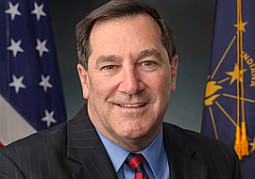 Wednesday, U.S. Senator Joe Donnelly released the following statement after the Senate Environment and Public Works Committee consideration of the Federal Water Quality Protection Act, S. 1140. The Federal Water Quality Protection Act, which Donnelly introduced with Sen. Barrasso (R-WY), would address the Environmental Protection Agency’s (EPA) and the Army Corps of Engineers’ attempt to define the Waters of the United States (WOTUS). The Environment and Public Works Committee passed the legislation, 11 to 9.
Wednesday, U.S. Senator Joe Donnelly released the following statement after the Senate Environment and Public Works Committee consideration of the Federal Water Quality Protection Act, S. 1140. The Federal Water Quality Protection Act, which Donnelly introduced with Sen. Barrasso (R-WY), would address the Environmental Protection Agency’s (EPA) and the Army Corps of Engineers’ attempt to define the Waters of the United States (WOTUS). The Environment and Public Works Committee passed the legislation, 11 to 9.
Donnelly said, “I know this from the Hoosier ag community: no one wants cleaner water or better land conditions than the families who live on American farms. The EPA needs to rewrite the Waters of the United States rule with input from the people who live and work on the land, alongside these waters every day. The EPA needs to consult with those impacted, including small business owners and farmers, on something so critical as defining the ‘Waters of the U.S.’ in a common sense way. Our bill would ensure that the WOTUS rule can be written in a way that works for Hoosiers and all Americans.”
Donnelly and Barrasso introduced the Federal Water Quality Protection Act with a bipartisan group of senators, including Senate Majority Leader Mitch McConnell (R-KY), in April.
Donnelly has continually expressed concern and frustration on behalf of the Hoosier ag community regarding confusing, burdensome regulations related to WOTUS. In March, Donnelly asked testifying stakeholders at a Senate Agriculture Committee hearing if they would support efforts to require the EPA to revise their proposed WOTUS rule within the Clean Water Act by following certain procedural steps and publishing a rule under an established set of guidelines. In December 2014, Donnelly questioned Chief of the Natural Resources Conservation Service (NRCS) Jason Weller of the U.S. Department of Agriculture. In October 2014, Donnelly requested the EPA and Army Corps of Engineers clarify and revise the jointly proposed rule defining WOTUS and the interpretive rule regarding exemptions for certain agricultural conservation practices.














